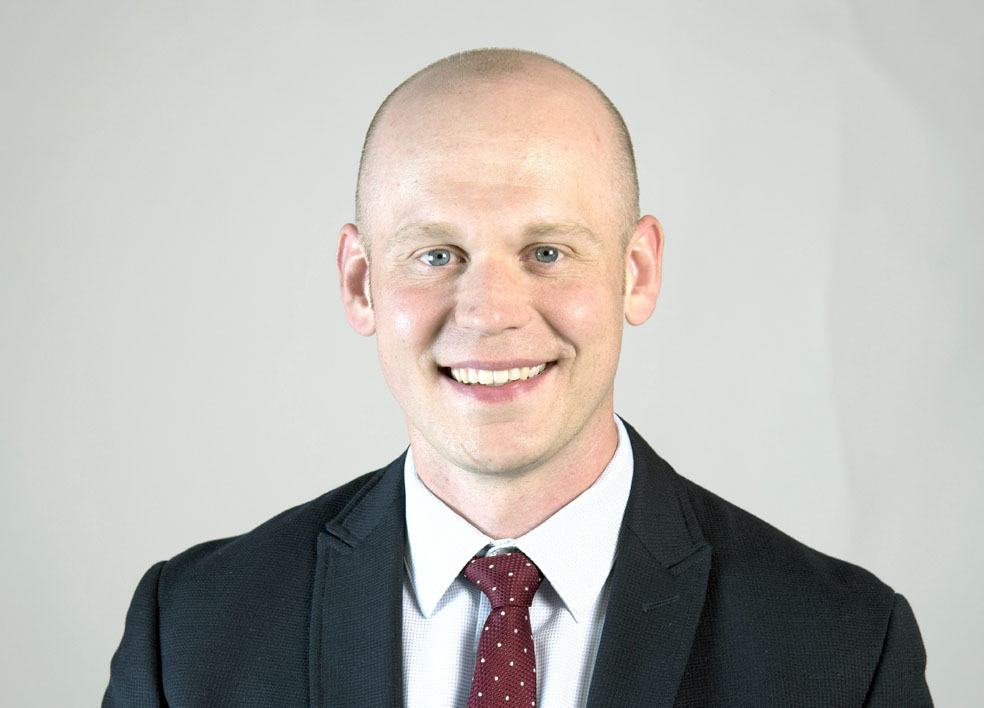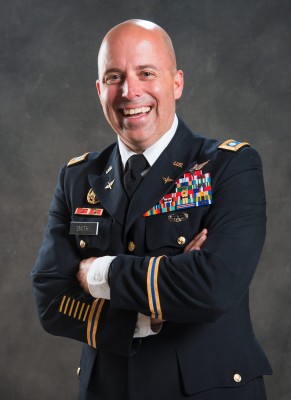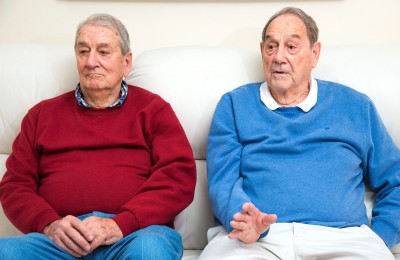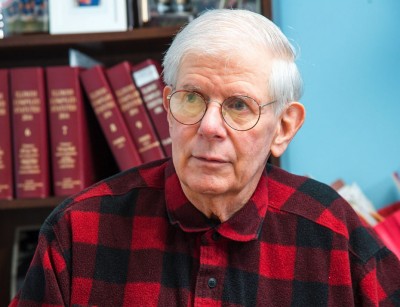Eric Swenson
By Paul Wood

Photo By Rick Danzl/The News-Gazette
PAXTON — In Ar-Ramadi, Iraq, as part of the 2007 surge, Eric Swenson was on a base that was attacked three or four times a day, whether it was mortars, rocked-propelled grenades or sniper fire.
He downplays the danger he was in, saying that the infantry serving outside the base faced far worse, with improvised explosive devices made by Al-Qaeda, whose Ar-Ramadi members went on to become the core of ISIS in the area, later operating out of Syria.
After earning two degrees at the University of Illinois, Swenson, 30, is back on the Urbana campus in the College of Business for Illinois Business Consulting.
While earning his degrees, he was active in student veteran organizations.
He enlisted in the Army in his junior year of high school, then went to boot camp shortly after his graduation in 2005 from Princeton High School.
“I came from a family of modest means,” he said. “I thought this could be the way to make a career. Looking back, it was one of the wisest moves I could have made.”
It wasn’t just a career — it was a family tradition.
“Both my grandfathers served, and my uncle was in Vietnam,” Swenson said.
“My family had soldiers on both sides of the Revolutionary War. I was also motivated by 9/11 to serve our country.”
Despite a mediocre high school career, Swenson scored very high on Army aptitude tests. He could choose any specialty he desired.
“I didn’t choose infantry because my girlfriend (now wife) would have kicked my butt,” he said.
His choice was intelligence. The skills include map-reading, database software and classified material handling.
“Honestly, it’s not as stringent as it might sound,” Swenson said.
With that training, he was assigned to the 19th Infantry, whose long history included the Boxer Rebellion at the turn of the 20th Century in China.
He spent a lot of time walking, but wasn’t directly involved in much of the most dangerous work common to the infantry.
“I wasn’t kicking down any doors,” Swenson said.
On his 20th birthday, Swenson was serving in Ar-Ramadi, Iraq, as part of the deployment of more than 20,000 additional soldiers to assist with the war on terror.
He directed briefings and served as a data analyst. He shared information with teams on where IEDs were placed, and had a hand in directing drone attacks.
“I was really good at it, but I was a small part of the operation,” he said.
Ar-Ramadi was a hot spot of rebellion and had some of the most intense fighting of the war in Iraq. His base was attacked three or four times a day.
“There was a crazy high casualty rate,” he said.
The fighting in Ar-Ramadi swelled, and came to be known as the Anbar Awakening, as an alliance of tribes came together to fight Al-Qaeda insurgents.
Thus, many in Anbar Province came to side with U.S. and other international forces.
On the other hand, he said, the Al-Qaeda insurgents “were the worst of the terrorists who became ISIS.”
The militia “took incredible risks” taking on Al-Qaeda, Swenson said.
“It was a watershed,” he said.
U.S. troops withdrew in 2011. Swenson has the utmost respect for “those who fought and died for that province.”
By that time, he’d already been medically discharged (in 2009) after getting sick in Iraq — dropping 50 pounds in nine weeks — and hurting his back as well.
“I was on a fast track to move up, but suddenly it was over,” he said. “To serve in the military is to sign up for hardship, something I’m very proud of, and that secured my future.”
When he came home, Swenson took advantage of the improved GI Bill, and enrolled at the UI, where he studied natural resources and environmental sciences, and worked at ADM and MacMurray College before returning to his alma mater.
Swenson is married, with two sons.
Do you know a veteran who could share a story about military service? Contact staff writer Paul Wood at pwood@news-gazette.com.
Read more stories from local veterans:
 Randall Smith
CHAMPAIGN — Lt. Col. Randall Smith has learned to move fast. He was pulled out of embattled Kosovo in 2001 to move on to …
Randall Smith
CHAMPAIGN — Lt. Col. Randall Smith has learned to move fast. He was pulled out of embattled Kosovo in 2001 to move on to …
 The Schweighart brothers
PESOTUM — Patriotic fever runs high here, and after the Pearl Harbor attack, all four Schweighart boys wanted to join th …
The Schweighart brothers
PESOTUM — Patriotic fever runs high here, and after the Pearl Harbor attack, all four Schweighart boys wanted to join th …
 Bernard Puglisi
CHAMPAIGN — Bernard Puglisi could easily have avoided serving as a Marine in Vietnam — in fact, he had to appeal a medic …
Bernard Puglisi
CHAMPAIGN — Bernard Puglisi could easily have avoided serving as a Marine in Vietnam — in fact, he had to appeal a medic …